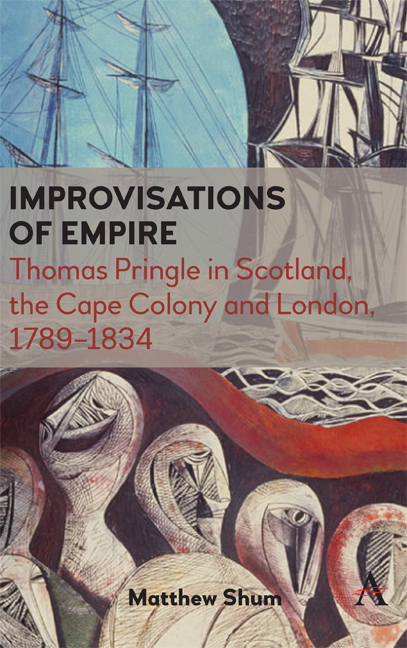3 - Cape Town and Beyond: 1822– 25
Published online by Cambridge University Press: 06 May 2020
Summary
It was Pringle's great misfortune— as it was of others— to cross the path of Lord Charles Somerset, the plenipotentiary figure of British authority at the Cape. Somerset, who had been governor since 1814, was a British aristocrat with a military and court background. In a letter to Colonial Secretary Bathurst in 1815, he declared his intention to run the colony as an “outwork to India” and to “sacrifice local considerations to the needs of that great Empire” (quoted in Edwards 1934, 19). Such imperial anachronism dominated Somerset's career at the Cape and became increasingly untenable as both global and local developments necessitated changes he was incapable of responding to. C. A. Bayly has described British colonial governorships of this period as “proconsular regimes” dominated by an adherence to “loyalism, royalism and aristocratic virtue” (1989, 194). Somerset's style of government reflected this ethos: it was autocratic, with effective power invested either in himself or those appointed by him; even judicially, Somerset's role as Judge of the Court of Appeal meant that he had the final say in any matters that involved infringements of the law. His aristocratic intransigence in the face of demands for judicial and other reforms, precipitated largely by the arrival of the British emigrants, eventually proved his downfall, and in 1827, under pressure both from the Whig lobby in parliament and disaffected settlers in the Cape, he resigned. Ironically, Pringle had at first benefited from Somerset's patronage: he approved generous grants of land to the Pringle party on the frontier, and when Pringle made his way to the Cape toward the end of 1822, it was to take up a government post set up for him by Somerset. Pringle's subsequent fallout with the governor was swift and brutal and came at a time when Somerset's affronted megalomania was at its worst.
Pringle had never envisaged his stay on the frontier as permanent; even before the Scottish party arrived at their settlement, he had used his letters of introduction to petition colonial officials for employment in Cape Town. Once he was in a position to relinquish his frontier obligations he did so; nor did he ever return there on any permanent basis.
- Type
- Chapter
- Information
- Improvisations of EmpireThomas Pringle in Scotland, the Cape Colony and London, 1789–1834, pp. 93 - 132Publisher: Anthem PressPrint publication year: 2020



